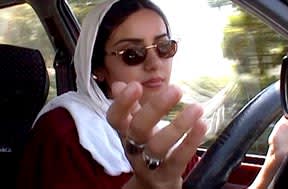Ten, the new film by Abbas Kiarostami, is the most pedantic film he's made, and that's not just because of the rigid structure (ten sequences, ten conversations in a car, two camera angles). The similarly minimalist A Taste of Cherry, while not a masterpiece, at least had a deep sense of mystery and scope. Ten treads on the verge of banality, in both form and content. While some of the conversations are very compelling, Kiarostami's Bazinian technique (just keep the camera in its place and the mysteries of life will be revealed
) serves only to record these encounters, it never really transcends them.
The film begins with the best sequence, in which a shockingly eloquent young boy gets drawn into a debate with his mother about her decision to get a divorce. The argument escalates into a shouting match, the mother fiercely making her proto-feminist case (Iranian women are not exactly wilting violets), and the kid, all of ten years old, contending that her actions didn't take his feelings into account and that her motivations were basically selfish. The mother is our constant companion throughout the film, picking up various passengers (all women, but for her son, with whom she continues the debate in subtler forms), and all of these encounters serve to illuminate the condition of women in contemporary Iran.
I prefer the Kiarostami that befuddles me, rather than the one who spells it all out. This is a director who can transform persistent, repetitive scenes into a spiritual affirmation (think of the desperate, insistent marriage proposal in Through the Olive Trees, or the extended scene of the car trying to crest the mountain without stalling in Life and Nothing More). In Ten we get the Kiarostami who seems fascinated when a prostitute compares marriage to her line of work ("You're the wholesalers we're the retailers"), which was a revelation in Shaw's time, but now seems like a banal irony.
The most remarkable aspects of this film are the things we've come to expect from Iranian films: non-professional performers who put American method actors to shame, and the blurring of fiction and documentary. The conversations all seem authentic they're not an imitation of anything and they feel like actual real-time events unfolding before your eyes (the mother and son are, in reality, mother and son). Still, that doesn't elevate the film all that much. It makes it fascinating to watch at times, but this is still a minor work from a major director. (Seville)
The film begins with the best sequence, in which a shockingly eloquent young boy gets drawn into a debate with his mother about her decision to get a divorce. The argument escalates into a shouting match, the mother fiercely making her proto-feminist case (Iranian women are not exactly wilting violets), and the kid, all of ten years old, contending that her actions didn't take his feelings into account and that her motivations were basically selfish. The mother is our constant companion throughout the film, picking up various passengers (all women, but for her son, with whom she continues the debate in subtler forms), and all of these encounters serve to illuminate the condition of women in contemporary Iran.
I prefer the Kiarostami that befuddles me, rather than the one who spells it all out. This is a director who can transform persistent, repetitive scenes into a spiritual affirmation (think of the desperate, insistent marriage proposal in Through the Olive Trees, or the extended scene of the car trying to crest the mountain without stalling in Life and Nothing More). In Ten we get the Kiarostami who seems fascinated when a prostitute compares marriage to her line of work ("You're the wholesalers we're the retailers"), which was a revelation in Shaw's time, but now seems like a banal irony.
The most remarkable aspects of this film are the things we've come to expect from Iranian films: non-professional performers who put American method actors to shame, and the blurring of fiction and documentary. The conversations all seem authentic they're not an imitation of anything and they feel like actual real-time events unfolding before your eyes (the mother and son are, in reality, mother and son). Still, that doesn't elevate the film all that much. It makes it fascinating to watch at times, but this is still a minor work from a major director. (Seville)
